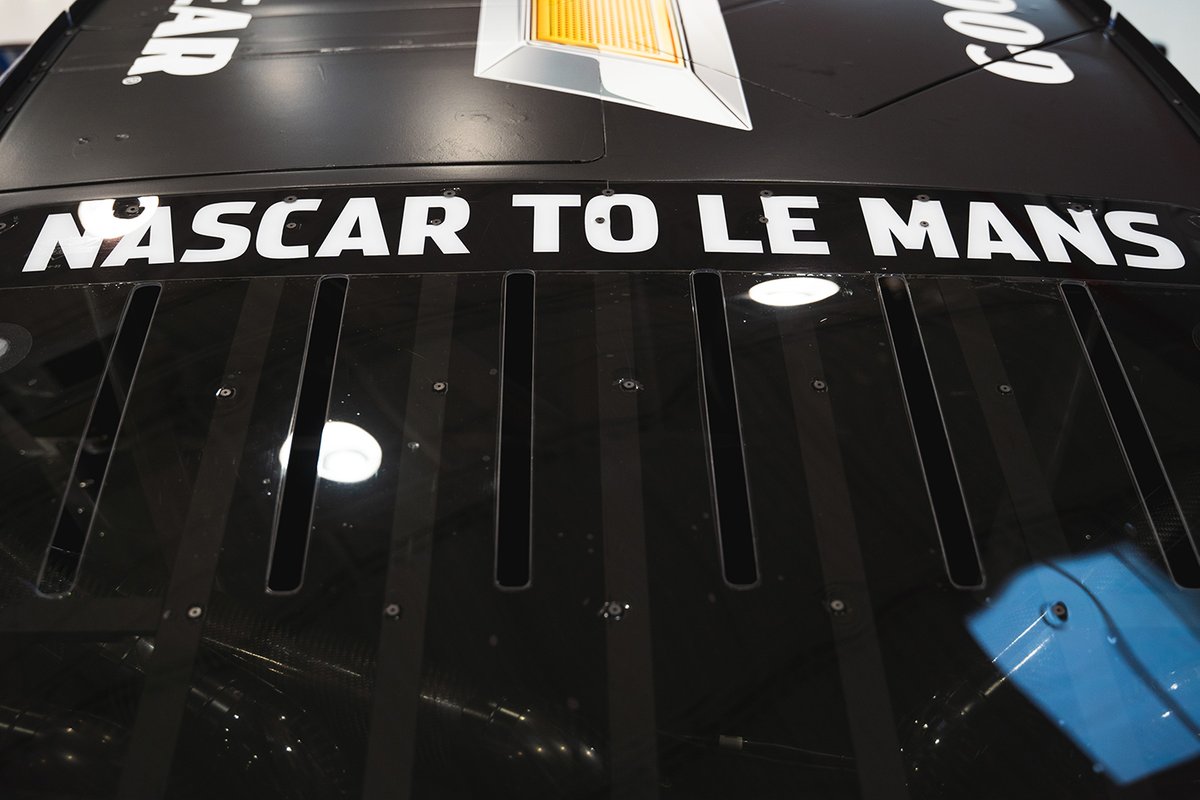
The Garage 56 project, which is anticipated to be approved for entry by l'Automobile Club de l'Ouest (ACO) in the coming weeks, is a partnership between NASCAR, Hendrick Motorsports, Chevrolet and Goodyear.
The systems and components of the Chevrolet Camaro ZL1 are largely unchanged from the Next Gen racecar that competes in the NASCAR Cup Series. Among the changes made to prepare the car for an endurance race are functioning headlights and taillights, a larger fuel cell, carbon brake discs and specially-designed Goodyear Eagle racing tires.
“From the beginning of this project, it was important to us that the car we bring to Le Mans is a true NASCAR stock car,” said Jim France, NASCAR Chairman and CEO. “While there have been some adjustments to allow the car to compete in a 24-hour endurance race, fans in Le Mans will be treated to the full NASCAR experience.”

On-track testing for the project began last August at Road Atlanta with two-time Le Mans 24 Hours winner Mike Rockenfeller, who will be joined by seven-time NASCAR Cup champion Jimmie Johnson and 2009 Formula 1 world champion Button behind the wheel at the upcoming 100th anniversary of the world-famous endurance race.
Button said: “I think people should see NASCAR for what it really is, which is what they’ll get to experience. I'm really looking forward to seeing the other competitors and seeing the fans' opinion on the car and what we are trying to achieve.”

Speaking about its driver lineup, project leader Chad Knaus believes he has a “perfect mixture”.
“When it started we wanted to have guys or gals who we considered to be elite,” he said. “We talked to a lot of different drivers, from a lot of different genres, and ending up where we did is a perfect mixture that you could ever ask for to go drive this thing and represent NASCAR at Le Mans.”
The test car and its previous iteration have logged more than 3,600 miles at six separate tests at Road Atlanta, Virginia International Raceway, Goodyear Proving Grounds, Carolina Motorsports Park, Sebring International Raceway and Daytona International Speedway.

NASCAR Next Gen Garage 56 Chevrolet Camaro ZL1 technical specifications:
Length: 195.4” / 4,961 mm
Width: 78.6” / 1,996.4 mm
Height: 50.4” / 1,280 mm
Wheelbase: 110” / 2,794 mm
Weight: 2,960 lbs / 1,342 kg
Spoiler: 6” / 152.4 mm
Body: 2023 Chevrolet Camaro ZL1 composite symmetric body featuring integral flap systems, camera mounts and dive planes
Underwing: Full carbon undertray w/Le Mans-spec splitter, engine panel and rear diffuser
Chassis: Steel tubing w/bolt-on front and rear clips and front/rear bumpers
Transaxle: 5-speed paddle shift sequential with ramp and plate differential
Suspension (Front and rear): Double wishbone billet aluminum control arms w/adjustable coil over shock absorbers
Steering: Rack and pinion
Wheels: Dry Fronts – BBS-G56 forged aluminum 18” x 12.5” / 462 mm x 317.5 mm
Dry Rears – BBS-G56 forged aluminum 18” x 13.5” / 462 mm x 342.9 mm
Wets – BBS forged aluminum 18” x 12” / 462 mm x 304.8 mm
Tires: Dry Fronts – Goodyear Racing Eagles – 365/35R18 (day / night)
Dry Rears – Goodyear Racing Eagles – 380/35R18 (day / night)
Wets – Goodyear Racing Eagles – 365/35R18 (inter / full)
** Cured in-tire, passive TPMS system, Powered by Goodyear Sightline
Brakes: Six piston monobloc front calipers / four piston monobloc rear calipers – heavy duty carbon disc packages
Front Brake Rotors: 15” x 1.57” / 381 mm x 40 mm carbon disc w/titanium bell
Rear Brake Rotors: 14” x 1.26” / 355.6 mm x 32 mm carbon disc w/titanium bell
Engine: NASCAR Cup Series Chevrolet R07 cast iron small block V8
Engine displacement: 358 cu in / 5.8 L
Induction system: Naturally aspirated
Fuel system: Fuel injection
Oil system: Dry sump
Engine cooling: Air exits radiator through hood louvers
Exhaust: Split-side exit exhaust
Fuel cell: 32 gallons / 127 L (Total Excellium Racing 100)







